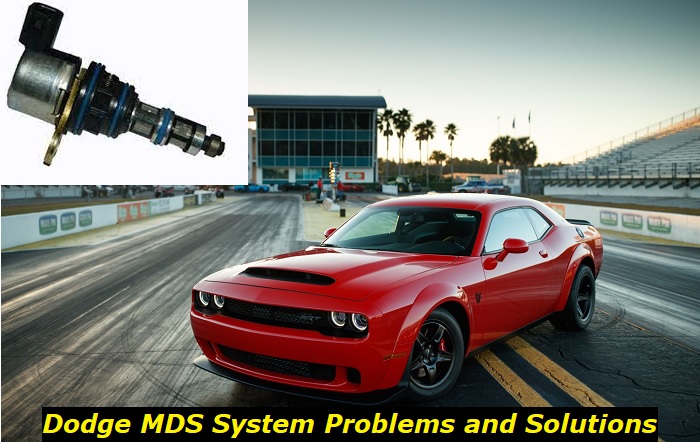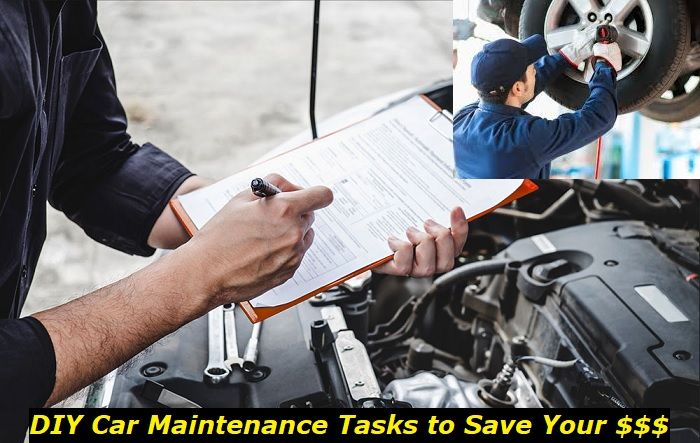The Multi-Displacement System or MDS is a pretty good feature introduced by Chrysler, which was later carried over to Dodge vehicles such as the Charger, Magnum, Durango, Ram, and Challenger. It works by deactivating four of the eight cylinders when the V8 engine is not under heavy load. This helps to conserve fuel, reduce emissions, and increase power. The deactivated cylinders are reactivated as required, based on how much power is needed.
Cylinder deactivation system problems highlights
- Level of importance:Medium
- Commonreasons:Internal problems in the system, leaks, electrical issues
- DIY inspection:Impossible
- DIY repair:Impossible
- Price for repair:$250 - $800
- Can you drive?Yes, butthe power may be limited
- Ways to fix:Only professional repair is possible

What You Will Learn Here
To provide you with a background on the technology and show you how you can deal with a possible failure in its system, this article is broken down into the following topics:
- What is the MDS and how it works in the Dodge engine?
- Most known issues with regard to the application of the MDS in Dodge vehicles plus their solutions.
- How to maintain the performance of MDS in your Dodge?
About the MDS
The MDS is designed to ensure that all eight cylinders are firing at the same time whenever necessary. It also ensures that no cylinder is overloaded or under-utilized. It was used by vehicles under the Chrysler, Dodge, and Jeep brands.
To make sure this happens, the ECM (Engine Control Module) monitors a variety of criteria such as air/fuel ratio, throttle position, and vehicle speed. If these parameters meet certain pre-set thresholds for any given cylinder, it will be deactivated automatically by the ECM to optimize overall performance.
The MDS system is also designed to provide a smooth transition between four and eight cylinders firing, ensuring that drivers don't feel any jerkiness or jerky acceleration when the cylinders are reactivated. This also helps to improve fuel economy. Overall, the MDS system makes Dodge vehicles more efficient without compromising performance or power.
Most Common Issues and Possible Solutions of the MDS in Dodge Vehicles
There are many complaints about the Dodge MDS. The most common is its inability to significantly save on fuel and the failure of the parts operated by the system. As we will show here, some of these may be the culprit behind the said problems:
1. Breakage of the System Due to Oil Contamination
The MDS operates using various moving parts of the engine. Therefore, proper lubrication should be present at all times by keeping the oil level and quality of your Dodge in check.
If the MDS system fails due to oil contamination, it can lead to decreased engine performance, increased emissions, and higher fuel consumption. This is the reason why a lot of Dodge vehicles equipped with the tech tend to fail after raking in a lot of mileage.
The most common causes of oil contamination are improper maintenance such as not changing the oil or using contaminated oil, excessive crankcase pressure, coolant leaks, worn-out seals, improper installation of components such as gaskets or filters, misalignment of parts during installation, and failure of other related parts that cause leakage into the oil pan.
To assess the source of the problem, a mechanic should look for symptoms such as oil leaks, grinding or clunking noises coming from the engine, decreased power or torque output, higher fuel consumption, and elevated exhaust emissions.
Other manual checks include inspecting the condition of the MDS components and checking the oil level and pressure. With specialized tools such as a borescope camera and electronic diagnostics equipment, further evaluation of these parts can be done to determine if they are worn out or otherwise damaged.
The solution to this problem usually requires replacing some of the affected parts with new ones. This includes replacing any gaskets that may have been previously installed incorrectly, replacing filters, cleaning up coolant leaks, installing seals that may have become worn out due to excessive crankcase pressure, and replacing any other related parts that may have failed.
In addition, it is important to make sure the oil used in the engine is of good quality and cleanliness level, as well as properly maintaining the vehicle by following a regular service schedule. Taking these steps should help prevent further oil contamination and ensure that the MDS system functions properly.
By addressing this issue in a timely manner, costly repairs from engine damage can be avoided. It is recommended to seek professional help if necessary since effective repair of this problem requires knowledge and skill. Doing so will result in improved fuel economy and lower emissions while helping preserve the life of your Dodge engine.
2. The Dreaded MDS Lifter Failure
The most common issue and one of the worst things associated with the MDS of Dodge is lifter failure. This is normally attributed to the way the system is implemented but it is also more likely due to oil contamination as discussed earlier.
When the lifters fail, it can lead to rattling noise coming from the engine, reduced power and torque output, poor fuel economy, high emissions, and even stalling of the engine. To assess if this is indeed the source of the problem, a mechanic should do a manual assessment such as inspecting for signs of wear in all components of the MDS system including its lifters. The use of specialized tools may also be necessary to properly diagnose what needs to be done.
Again, the solution requires replacing any worn-out or damaged parts affected by oil contamination such as filters, gaskets, seals, and other related parts before carrying out repairs or parts replacements on the lifter, roller, needle bearings, and cam lobe. Likewise, good quality and clean oil should be used after the repairs. All these are labor intensive that requires professional help.
Another way around this is by swapping the stock parts with compatible non-MDS lifters and retainers. However, you will have to disable the MDS after that via an ECM flash to prevent bigger problems along the way.
3. Stuck Valve
When the valves in a Dodge MDS get stuck, it can cause serious engine problems. The most common causes of this issue include low oil pressure, clogged oil passages, or worn valve lifters.
To identify the root of the problem, start by looking for any signs that could indicate an internal engine failure such as strange noises coming from the compromised area or white smoke coming out of the exhaust pipe. Next, do some manual checks to ensure all components are working correctly and that there is no dirt blocking any parts.
Use a compression tester to verify the pressure on all cylinders and a stethoscope to find any abnormal sounds. You can also utilize a borescope or a valve spring compressor to get visuals of the affected parts for further diagnosis.
Depending on what is causing your valves to remain stuck, there are several solutions that can be performed if caught in time. If it's low oil pressure due to a lack of lubrication, then increasing the amount of oil or changing it with a higher-quality solution may do the trick. Clogged passages can be cleared out with solvent and a thorough flush before fresh oil is added afterward.
For worn valve lifters, they will need to be replaced completely along with possibly other components in their vicinity such as springs or pushrods depending on how badly damaged they are. If the issue is not addressed in time, then more serious damage may come to your engine and require expensive repairs or a full replacement. Therefore, it's best to diagnose the source of the problem immediately and take action accordingly.
As seen here, the valves getting stuck are related to the preceding problems in this list, and thus, share the same solution. Because this kind of technical problem requires expert knowledge, it's always recommended that you take your vehicle to a certified technician for complete diagnosis and repair.
Make sure to keep all documentation available in case more information is needed. With proper maintenance and attention, these kinds of problems can be avoided in the future and your car can stay running smoothly for many years.
Maintaining the Performance of the Dodge MDS
Following these tips should help you maintain the proper operation of the Dodge MDS system and keep it running smoothly for many years to come:
1. Regular Service
It's important to ensure that your vehicle gets regular oil changes and other preventative maintenance services such as flushing the engine and checking the fuel system. Doing so prevents any dirt, debris, or contaminants from entering the MDS system which can quickly lead to problems.
2. Use Quality Parts
If you're planning on replacing any parts related to this system, make sure they are of good quality and compatible with your car's model year. Poor-quality parts will not perform in the same way as genuine ones and can even cause more damage down the line.
3. Change Oil Filter Regularly
The oil filter should be replaced every time you change your car's oil. This prevents any kind of dirt or debris from entering the oil passages and can help you save money in the long run as you won't have to pay for more frequent repairs.
4. Keep it Clean
The Dodge MDS system should be regularly inspected and cleaned whenever necessary to ensure that all parts are functioning properly. Make sure to check all connections, hoses, and seals for any signs of wear or damage. Also, make sure to use a quality lubricant when lubricating the system's components.
5. Take Professional Help
When dealing with complex issues such as stuck valves, it's best to take your car to a certified technician who is experienced in dealing with this type of problem. They will be able to diagnose the issue and offer a solution that is best for your vehicle. It's also important to make sure you have all of your documents ready in case more information is needed.
Conclusion
The failure of the parts associated with the MDS of Dodge can easily affect the other moving parts of your engine. With regular attention and care, you can be assured that any problems related to this system will be addressed before they become too serious and costly.
Proper maintenance, however, requires professional expertise, so don't hesitate to take your car to an authorized service center whenever necessary.
About the authors
The CarAraC research team is composed of seasoned auto mechanics and automotive industry professionals, including individuals with advanced degrees and certifications in their field. Our team members boast prestigious credentials, reflecting their extensive knowledge and skills. These qualifications include: IMI: Institute of the Motor Industry, ASE-Certified Master Automobile Technicians; Coventry University, Graduate of MA in Automotive Journalism; Politecnico di Torino, Italy, MS Automotive Engineering; Ss. Cyril and Methodius University in Skopje, Mechanical University in Skopje; TOC Automotive College; DHA Suffa University, Department of Mechanical Engineering






Add comment